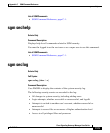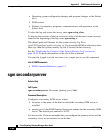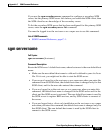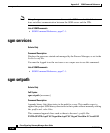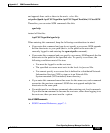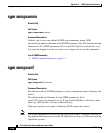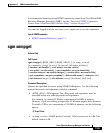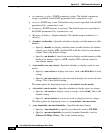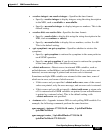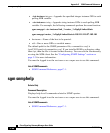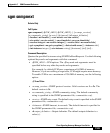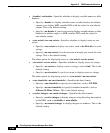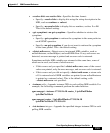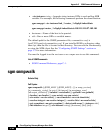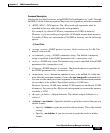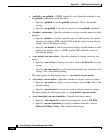
C-87
Cisco Signaling Gateway Manager User Guide
OL-5742-01
Appendix C SGM Command Reference
sgm snmpget
• --resolve-integer|--no-resolve-integer—Specifies the time format:
–
Specify --resolve-integer to display integers using the string description
in the MIB, such as available or unavailable.
–
Specify --no-resolve-integer to display integers as numbers. This is the
default setting.
• --resolve-bits|--no-resolve-bits—Specifies the time format:
–
Specify --resolve-bits to display bits using the string description in the
MIB, such as continue or ruleset.
–
Specify --no-resolve-bits to display bits as numbers, such as 1 or 14.
This is the default setting.
• --get-sysuptime|--no-get-sysuptime—Specifies whether to retrieve the
sysuptime:
–
Specify --get-sysuptime to retrieve the sysuptime in the same packet as
each SNMP operation.
–
Specify --no-get-sysuptime if you do not want to retrieve the sysuptime
in the same packet. This s the default setting.
• --detect-mib-error—Detects errors in returned MIB variables, such as
noSuchInstance, noSuchObject, and endOfMibView. If any such errors are
detected, an error message is printed and an error code is returned.
Sometimes multiple MIB variables are returned at the same time, some of
which are in error, and some of which are not.
–
If this occurs and you specified --detect-mib-error, none of the correct
values are printed, only the error message, and an error code is returned.
–
If this occurs and you did not specify --detect-mib-error, a return code
of 0 is returned and all MIB variables are printed (even noSuchInstance
is printed as a returned value). This is the default setting, with
--detect-mib-error not specified.
• --instance oids—Appends instance OIDs to each polling MIB variable. For
example, the following commands perform the same function:
sgm snmpget --instance 172.18.16.10 router_1 ipAdEntIfIndex
ipAdEntNetMask
sgm snmpget router_1 ipAdEntIfIndex.172.18.16.10
ipAdEntNetMask.172.18.16.10



